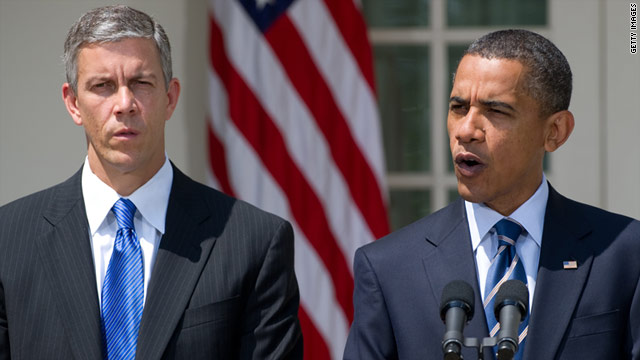The opt-out movement against taking the tests is growing, and so is the Obama administration’s ire.
By Jason L. Riley
May 5, 2015

President Obama, right, speaks about education in 2011 accompanied by U.S. Secretary of Education Arne Duncan.
The term “soccer mom”—political shorthand for the upscale suburban women President Clinton courted so successfully in the 1990s—may have fallen out of use with the Beltway set in more recent years, but this swing voting bloc is still around. Just ask Arne Duncan.
As President Obama’s education secretary and the administration’s head cheerleader for the new Common Core academic standards, Mr. Duncan has spent four years trying to convince the country that the biggest problem with K-12 schooling is insufficient federal intervention. His problem is that the more parents learn about this federal effort to impose uniform math and reading standards across state lines, the less they like the idea. And women, who are more likely than men to rank education as “very important” in political surveys, seem to harbor a special disdain for Common Core.
A national poll released by Fairleigh Dickinson University earlier this year put approval for the new standards at 17%, against 40% who disapproved and another 42% who were undecided. A breakdown by gender had Common Core support at 22% for men and only 12% for women.
Wealthier parents tend to be the most skeptical, and they are not satisfied with merely sounding off to pollsters. This year hundreds of thousands of students across the country are boycotting Common Core-aligned state exams, and this so-called opt-out movement has been growing. Preliminary estimates are that between 150,000 and 200,000 students skipped New York state’s mandatory English exams last month, up from the 49,000 in 2014.
The Obama administration is aware of these developments, though you might question how it has chosen to respond to critics. “It’s fascinating to me,” said Mr. Duncan in 2013, “that some of the pushback is coming from, sort of, white suburban moms who—all of a sudden—their child isn’t as brilliant as they thought they were and their school isn’t quite as good as they thought.”
More recently, the administration has pivoted from insulting parents to threatening them. Mr. Duncan told an education conference in April that if the boycott numbers continue to rise, “then we have an obligation to step in.”
His spokesman later informed reporters that the administration is considering whether to withhold federal funding for districts with test-participation rates below 95%. Given that there is no political will or effective mechanism for punishing test opponents without turning them into martyrs, this is an idle threat. The districts doing most of the boycotting are affluent and not dependent on federal money, which in any case parents could easily replace out of pocket.
Nor is this backlash as “fascinating” as Mr. Duncan claims. For the purposes of opposing accountability measures in No Child Left Behind, the 2001 federal education law signed by George W. Bush, the Obama administration told these white suburban moms that their schools were just fine. For the purposes of imposing Common Core, Mr. Duncan is telling them the opposite.
No Child Left Behind had its shortcomings, but Congress went to great lengths to preserve local control. The law’s objective was to produce information—disaggregated data on the racial, ethnic and income groups that were struggling academically. Unlike the Common Core standards and tests, No Child Left Behind didn’t tell schools what to do and what not to do. States were still in charge of determining what to teach and how to teach it.
“The one thing upper-middle-class parents want and have grown accustomed to having is the ability to control their kids’ education,” Jay Greene, an education reform scholar who teaches at the University of Arkansas, told me by phone this week. “They will purchase private school if they have to. They will move to another neighborhood if they must. And they will boycott testing if they feel their control is being interfered with.”
Forty-five states initially signed on to Common Core in return for more federal education funding, but the tide is turning and opponents—including teachers unions who don’t want student test scores, or any other objective measures, used to evaluate instructors—have the momentum. California and Utah already allow parents to opt out of assessments, and CBS News reported in March that 19 other states “have introduced legislation to either halt or replace Common Core.”
This issue won’t go away when students head home for summer vacation next month. The presidential candidates will have to declare themselves. Labor will pressure Hillary Clinton to at least hedge any support for testing, and it is increasingly difficult to imagine a Republican nominee who hasn’t distanced himself from Common Core.
Prof. Greene thinks the administration’s education agenda has crossed the wrong voters. “They’re going to lose,” he said, citing White House hubris and overreach. “You can’t beat organized upper-middle-class people. They will fight back and you will lose.”
Mr. Riley, a Manhattan Institute senior fellow and Journal contributor, is the author of “Please Stop Helping Us: How Liberals Make It Harder for Blacks to Succeed” (Encounter Books, 2014).
No comments:
Post a Comment